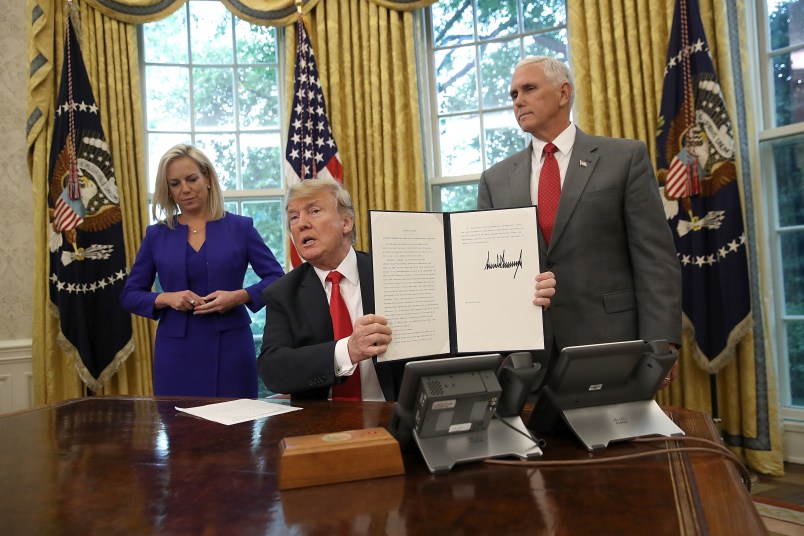After weeks of insisting that only Congress could change the administration’s policy of separating migrant children and their parents, President Trump signed an executive order on Wednesday afternoon that would allow the government to detain families together as they await their immigration hearings. The administration will not, however, cease its policy of bringing criminal charges against immigrants who commit the civil violation of crossing the border unauthorized.
“We are keeping a very powerful border. And it continues to be a zero tolerance,” Trump said. “We have zero tolerance for people that enter our country illegally.”
Though Trump announced Wednesday that his new policy would “keep families together,” the actual text of the executive order gives the administration plenty of wiggle room, saying they would only work to keep families together “where appropriate and consistent with law and available resources.”
And while the families currently being held are under the jurisdiction either of Homeland Security or the Department of Health and Human Services’ Office of Refugee Resettlement, the executive order directs the Defense Department to turn over “any existing facilities available for the housing and care of alien families, and…construct such facilities if necessary and consistent with law.”
Later in the executive order is a provision that could roll back longstanding protections for children in federal custody. The text directs Attorney General Jeff Sessions to ask federal courts to modify a decades-old ruling that bars the detention of children by immigration authorities for longer than 20 days. The administration will now ask courts for permission “to detain alien families together throughout the pendency of criminal proceedings for improper entry or any removal or other immigration proceedings” with no set time limit.
As he signed the order, President Trump acknowledged to reporters that this move may violate that federal court settlement, known as Flores.
“There may be some litigation,” he said. “But we’re keeping the family together.”
There is nothing in the executive order that requires the government to reunite any of the thousands of children who have already been separated from their parents and are being held in the U.S. government’s custody. The White House did not respond to TPM’s questions about whether such a plan exists.
Human rights groups and Democratic lawmakers are slamming the administration’s move.
“This executive order would replace one crisis for another,” said Anthony Romero, executive director of the American Civil Liberties Union. “Children don’t belong in jail at all, even with their parents, under any set of circumstances. If the president thinks placing families in jail indefinitely is what people have been asking for, he is grossly mistaken.”
Both Trump and Homeland Security Secretary Kirstjen Nielsen, who stood beside the president as he signed the order, said they are still counting on Congress to pass bills to permanently change U.S. immigration law to allow the administration to prosecute and detain families indefinitely.
In the executive order itself, Trump falsely blames Congress for his own policy of separating parents and children, writing: “It is unfortunate that Congress’s failure to act and court orders have put the Administration in the position of separating alien families to effectively enforce the law.”
Republicans in Congress are currently refusing to back Democratic bills in the House and Senate that would prohibit the government from tearing immigrant families apart. Because those bills, unlike their GOP counterparts, do not allow indefinite family detention, they would likely bring back the previous administration’s practice of allowing most asylum-seeking families supervised release until their court hearings, which take months or even years.
Efforts to pass one of the growing pile of GOP-backed bills, however, had all but collapsed in the House by Wednesday evening, bogged down by Republican infighting. Some GOP lawmakers even wondered aloud if the president’s executive order had removed the pressure on them to act.
“If the problem is no longer there, the Congress will definitely not act to solve a future problem,” Sen. Roy Blunt (R-MO) told reporters. “If you want to solve the problem, the pressure of trying to get families and kids back together in the shortest period of time is probably the kind of dynamic we need.”







Chiselin’ Trump: “Alright, then. We’ll just execute the whole lot of them. That’s what the Democrats always wanted.”
Trump:
I guess eventually we’ll have to thank him for activating the Democratic base, and getting out the Hispanic and Latino vote…
In essence, Trump signs a blatantly illegal order mandating permanent imprisonment for asylum seeker families as a way to keep the policy of kidnapping and imprisoning babies and children. It’s a transparent scam, and one that the legitimate media need to expose.
He simply doesn’t get it nor will he ever. He can play all the games he wants but it will never make him the bestest president evah.